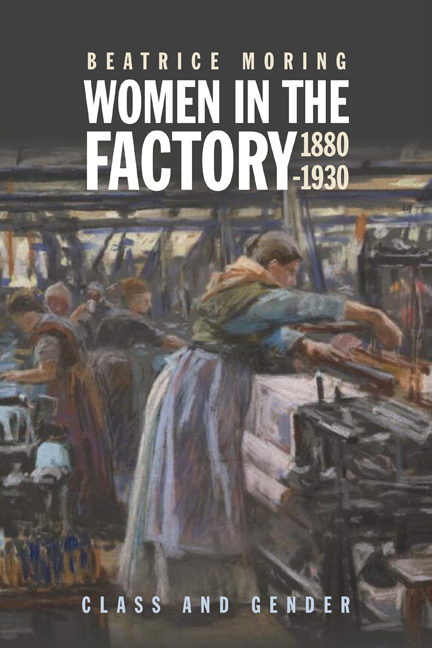Book contents
- Frontmatter
- Contents
- List of Illustrations
- Introduction – Why Women in the Factory?
- 1 Gender And Class – Male Unions, Political Movements and the Female Vote
- 2 Women in Industry: Work, Sectors, Age and Marital Status
- 3 Women, Earnings and the Household – Why the Factory?
- 4 Accidents, Compensation, Laws and Inspection
- 5 Middle Class Girls, Education and Entry into the Civil Service
- 6 The Female Factory Inspectors – How, Why and Who
- 7 Factory Inspection Activity
- 8 Class, Gender and Communication
- Conclusion
- Appendix 1 The Right for Women to Vote in National Elections
- Appendix 2 Women in the Workforce
- Appendix 3 Women, Work, Earnings and Family
- Appendix 4 Accidents, Workplace Acts and Regulations
- Appendix 5 Education
- Appendix 6 Female Inspectors
- Appendix 7 Inspectors, Activity
- Appendix 8 The Female Inspectors and Society
- Bibliography
- Index
Appendix 8 - The Female Inspectors and Society
Published online by Cambridge University Press: 09 May 2024
- Frontmatter
- Contents
- List of Illustrations
- Introduction – Why Women in the Factory?
- 1 Gender And Class – Male Unions, Political Movements and the Female Vote
- 2 Women in Industry: Work, Sectors, Age and Marital Status
- 3 Women, Earnings and the Household – Why the Factory?
- 4 Accidents, Compensation, Laws and Inspection
- 5 Middle Class Girls, Education and Entry into the Civil Service
- 6 The Female Factory Inspectors – How, Why and Who
- 7 Factory Inspection Activity
- 8 Class, Gender and Communication
- Conclusion
- Appendix 1 The Right for Women to Vote in National Elections
- Appendix 2 Women in the Workforce
- Appendix 3 Women, Work, Earnings and Family
- Appendix 4 Accidents, Workplace Acts and Regulations
- Appendix 5 Education
- Appendix 6 Female Inspectors
- Appendix 7 Inspectors, Activity
- Appendix 8 The Female Inspectors and Society
- Bibliography
- Index
Summary
Report in the local newspaper Silkeborg Dagblad, 6 June 1910:
At the meeting of the women's organisation Dansk Kvindesamfund in Silkeborg 1910.
The factory inspector Ragna Schou tabled a resolution to back the proposal by the social democratic party about support for widows and orphans. The resolution found wide support. When the law about pensions for widows and orphans, constituting a civic right not part of the poor relief system, was passed in parliament in 1913, it was hailed with joy together with the new factory law, in the journal Kvinden og samfundet.
Silkeborg Dagblad Arkiv Silkeborg Arkiv Dansk Kvindesamfund (/soeg?searchString=Dansk%20Kvindesamfund&ValgteArkiverIds=328) (Elisa Petersen, ‘Enkeloven og Fabrikloven vedtaget!, Kvinden og samfundet 15.5 1913, pp. 130–1)Betzy Kjelsberg and contact with workers
Betzy Kjelsberg often gave talks at unions and worker's clubs. This was a way of establishing contacts with those best aware of existing problems. After the intervention to incorporate advice from workers in connection with the installation of new paper machines, her reputation as genuinely interested increased. After having approached the health authorities and local inspectors with no result, the workers association representing loggers turned to Kjelsberg. While she was aware that this was not part of the remit of a factory inspector, she still decided to make a visit.
Together with representatives of the workers I was rowing the flat boat along the river, watched the floating of the logs, the sorting etc. On land we went to numerous places to see the huts for eating and resting … It is unbelievable that the officers have watched the dirt and mess year in and year out and done nothing.
She personally turned to one of the company directors and wrote to the overseer and begged them to remedy the worst problems instantly and later deal with the others. She was soon told by the workers that many of the problems had been rectified and received a heartfelt thank you for her visit (Magnhild Folkvord, Betzy Kjelsberg: feminist og brubyggjar (Oslo, 2016), pp. 126–7).
- Type
- Chapter
- Information
- Women in the Factory, 1880-1930Class and Gender, pp. 264 - 269Publisher: Boydell & BrewerPrint publication year: 2024



